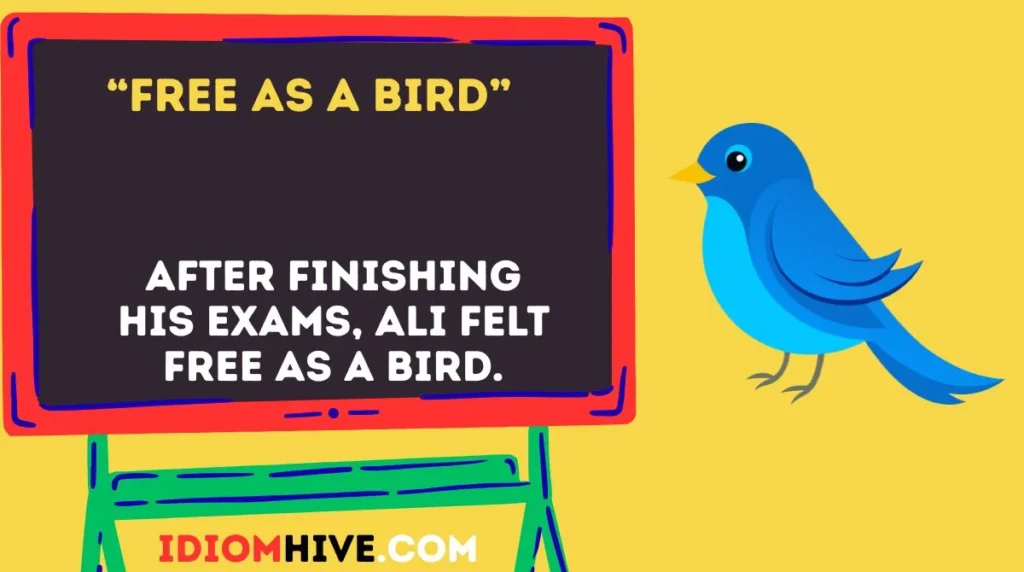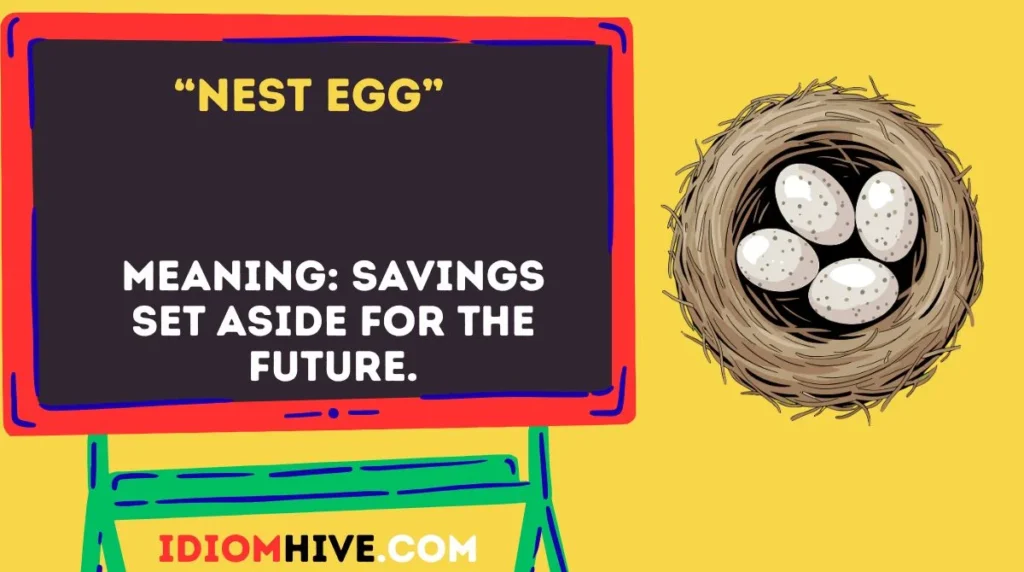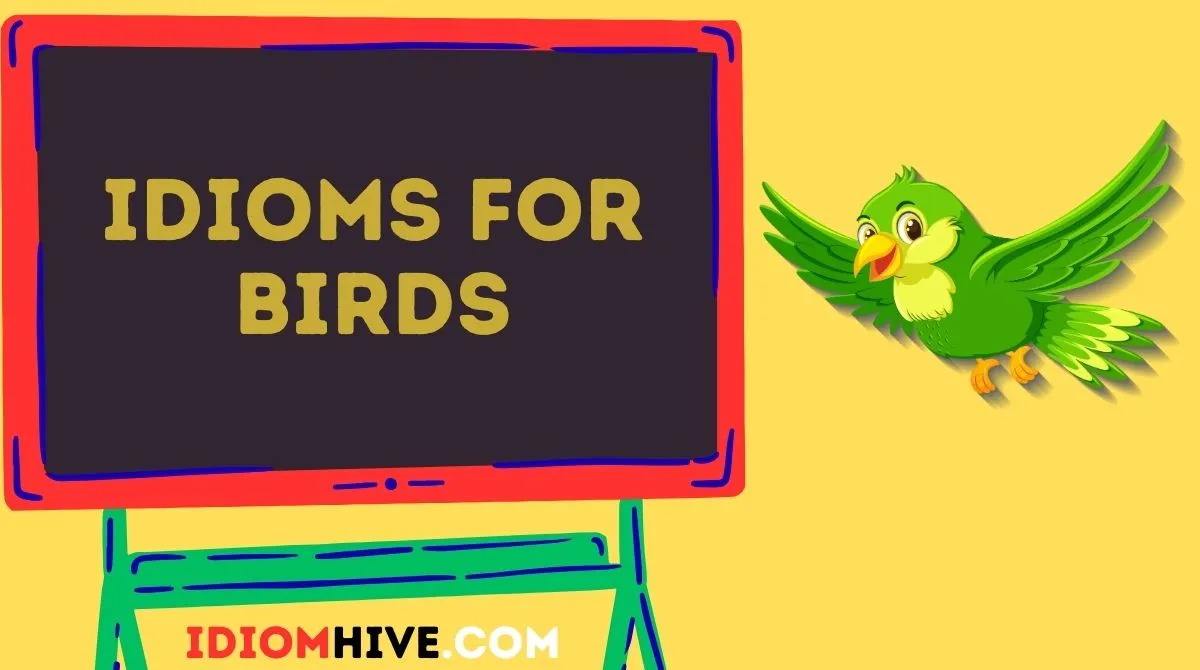Language is full of colorful expressions, and one of the most fascinating areas is idioms. An idiom is a phrase or saying that has a meaning different from the literal words.
Instead of taking the words “fly the nest” literally, for example, we understand it as “leaving home to live independently.” Idioms help make English richer, more creative, and often easier to connect with in everyday conversations.
When it comes to animals, birds have inspired hundreds of idioms in English. Birds are often linked with freedom, wisdom, and beauty, but they can also represent foolishness, speed, or opportunity.
Learning idioms for birds can give your English expression wings — whether you’re speaking casually, writing stories, or even presenting at work. In this article,
we’ll explore the most popular bird-related idioms, grouped into themes, along with meanings, examples, and tips to use them naturally.
Did You Know?
The English language has more than 200 bird-related idioms! Birds have been a symbol in stories, myths, and proverbs across cultures for centuries. For example, ravens were once thought to bring bad luck, while doves symbolized peace. That’s why many bird idioms carry hidden cultural meanings beyond just their literal words.
Bird Idioms About Freedom and Movement
“Free as a bird”

Meaning: Completely free, with no restrictions.
Example: After finishing his exams, Ali felt free as a bird.
Similar Idiom: “Footloose and fancy-free.”
Reflection: Common in casual conversation to describe freedom from stress or obligations.
“Bird’s-eye view”
Meaning: A broad view of something from above or from a higher perspective.
Example: From the mountain top, we had a bird’s-eye view of the entire city.
Similar Idiom: “Panoramic view.”
Reflection: Used in both casual and formal settings, especially in travel or business reports.
“Fly the nest”
Meaning: To leave home and live independently.
Example: Their youngest child finally flew the nest and moved to college.
Similar Idiom: “Leave the nest.”
Reflection: Often used in family conversations about children growing up.
“Spread your wings”
Meaning: To try new things or gain independence.
Example: It’s time for you to spread your wings and take on new challenges.
Similar Idiom: “Step out of your comfort zone.”
Reflection: Inspirational; used in motivational talks or writing.
“A sitting duck”
Meaning: An easy target, vulnerable to attack or harm.
Example: Without antivirus software, your computer is a sitting duck.
Similar Idiom: “Easy prey.”
Reflection: Used in both everyday conversation and professional warnings.
“Wild goose chase”
Meaning: A pointless or hopeless search.
Example: Looking for that old file was a wild goose chase.
Similar Idiom: “Fool’s errand.”
Reflection: Informal, used when something is frustrating or wasted effort.
“Eagle-eyed”
Meaning: Very observant; noticing small details.
Example: The teacher was eagle-eyed and caught every mistake.
Similar Idiom: “Sharp-eyed.”
Reflection: Often used to describe people with keen vision or attention.
Bird Idioms About Communication and Gossip
“A little bird told me”
Meaning: Someone secretly gave me information.
Example: A little bird told me you got promoted — congratulations!
Similar Idiom: “Heard through the grapevine.”
Reflection: Light-hearted and informal.
“Early bird”
Meaning: A person who wakes up or arrives early.
Example: I’m an early bird, so I finish most of my work before lunch.
Similar Idiom: “Morning person.”
Reflection: Used daily, especially when discussing habits.
“The early bird catches the worm”
Meaning: Success comes to those who act quickly or start early.
Example: She got the job because she applied first — the early bird catches the worm!
Similar Idiom: “Strike while the iron is hot.”
Reflection: Popular proverb, often motivational.
“Parrot fashion”
Meaning: Repeating something without understanding it.
Example: He learned the speech parrot fashion, but couldn’t explain it.
Similar Idiom: “By rote.”
Reflection: Informal, often used in education contexts.
“To crow about something”
Meaning: To brag or boast.
Example: He kept crowing about his team’s victory.
Similar Idiom: “Blow your own trumpet.”
Reflection: Informal, sometimes slightly negative.
“Night owl”
Meaning: A person who stays up late.
Example: I’m a night owl, so I work better after midnight.
Similar Idiom: “Late riser.”
Reflection: Everyday usage for personality types.
“As the crow flies”
Meaning: The shortest distance between two places.
Example: The town is 10 miles away as the crow flies.
Similar Idiom: “Direct route.”
Reflection: Used in geography, travel, or daily planning.
“Sing like a canary”
Meaning: To confess or reveal secrets, often to authorities.
Example: The thief sang like a canary when the police questioned him.
Similar Idiom: “Spill the beans.”
Reflection: Informal, often crime-related.
Bird Idioms About Behavior and Personality
“Birdbrain”
Meaning: A foolish or silly person.
Example: Don’t be such a birdbrain, think before you act!
Similar Idiom: “Airhead.”
Reflection: Informal, often playful or teasing.
“Odd bird”
Meaning: A strange or unusual person.
Example: He’s an odd bird, but he’s very kind.
Similar Idiom: “Oddball.”
Reflection: Informal, casual description.
“Feather in your cap”
Meaning: An achievement or honor.
Example: Winning the award was a real feather in her cap.
Similar Idiom: “Badge of honor.”
Reflection: Often used formally to celebrate success.
“Like a duck to water”
Meaning: To learn something quickly and naturally.
Example: She took to painting like a duck to water.
Similar Idiom: “Second nature.”
Reflection: Positive and motivational.
“Get your ducks in a row”
Meaning: To get organized.
Example: Before the meeting, make sure you get your ducks in a row.
Similar Idiom: “Put things in order.”
Reflection: Common in professional and everyday settings.
“Kill two birds with one stone”
Meaning: To achieve two goals with one effort.
Example: By cycling to work, he kills two birds with one stone — exercise and transport.
Similar Idiom: “Two for the price of one.”
Reflection: Widely used in daily conversations.
“Pecking order”
Meaning: The ranking or hierarchy in a group.
Example: In the office, there’s always a pecking order.
Similar Idiom: “Chain of command.”
Reflection: Professional or casual contexts.
“Ruffle someone’s feathers”
Meaning: To upset or annoy someone.
Example: His rude comment really ruffled her feathers.
Similar Idiom: “Rub the wrong way.”
Reflection: Informal, often in emotional discussions.
“Take under your wing”
Meaning: To protect or guide someone.
Example: The manager took the new intern under her wing.
Similar Idiom: “Look after.”
Reflection: Positive, often used in mentoring or teaching.
“Eat like a bird”
Meaning: To eat very little.
Example: Don’t worry about the food, she eats like a bird.
Similar Idiom: “Tiny appetite.”
Reflection: Informal, common in daily talk.
Bird Idioms About Luck, Hope, and Opportunity
“A bird in the hand is worth two in the bush”
Meaning: It’s better to keep what you have than risk losing it.
Example: He didn’t sell his business because a bird in the hand is worth two in the bush.
Similar Idiom: “Better safe than sorry.”
Reflection: Old proverb, often in decision-making.
“Swallow your pride”
Meaning: To accept humiliation or admit you were wrong.
Example: He had to swallow his pride and apologize.
Similar Idiom: “Eat humble pie.”
Reflection: Formal and everyday situations.
“Nest egg”

Meaning: Savings set aside for the future.
Example: They built a nest egg for retirement.
Similar Idiom: “Rainy-day fund.”
Reflection: Common in financial discussions.
“Under the eagle’s wing”
Meaning: Being protected or watched carefully.
Example: The children were under their grandmother’s eagle’s wing.
Similar Idiom: “Shielded.”
Reflection: Used in both daily and formal contexts.
“To feather one’s nest”
Meaning: To use a position for personal gain.
Example: The corrupt official was accused of feathering his own nest.
Similar Idiom: “Line one’s pockets.”
Reflection: Negative, often in politics or business.
“Flew the coop”
Meaning: Escaped or left suddenly.
Example: When the police arrived, the suspect had already flown the coop.
Similar Idiom: “Run away.”
Reflection: Informal, often playful or dramatic.
“One swallow doesn’t make a summer”
Meaning: One sign of change doesn’t prove everything is different.
Example: He passed one exam, but one swallow doesn’t make a summer.
Similar Idiom: “Don’t jump to conclusions.”
Reflection: Often used as a wise saying.
“Like water off a duck’s back”
Meaning: Criticism or insults that don’t affect someone.
Example: His calm nature made the rude comments like water off a duck’s back.
Similar Idiom: “Brush it off.”
Reflection: Informal, motivational, or descriptive.
How to Use These Idioms in Daily Life
- In speaking: Bird idioms make conversations fun and vivid. Saying “I killed two birds with one stone” is more engaging than simply saying “I did two things at once.”
- In writing: Use bird idioms in stories, essays, or blogs to create imagery and cultural depth.
- In professional settings: Expressions like “get your ducks in a row” or “a feather in your cap” make your speech polished and relatable without being too casual.
Common Mistakes Learners Make With Idioms
- Using them too literally
❌ Wrong: He really killed two birds today.
✅ Correct: He achieved two things at once. - Overusing idioms in one sentence
❌ Wrong: I flew the nest, killed two birds, and got my ducks in a row all at once.
✅ Correct: I flew the nest and got organized for my new life. - Mixing idioms incorrectly
❌ Wrong: A little bird catches the worm.
✅ Correct: The early bird catches the worm.
FAQs
1. Why are there so many bird idioms in English?
Birds have always been part of human culture, symbolizing freedom, wisdom, and behavior. That’s why they appear in proverbs and idioms worldwide.
2. Are bird idioms formal or informal?
Some are casual, like “birdbrain,” while others like “feather in your cap” are formal. It depends on the situation.
3. Can I use bird idioms in business English?
Yes! Phrases like “get your ducks in a row” or “a bird’s-eye view” are common in meetings and reports.
4. What’s the easiest bird idiom to learn first?
Start with “early bird” or “free as a bird” — they’re simple and used often.
5. Do other languages also have bird idioms?
Yes, many languages include bird-related sayings, though the meanings may differ.
Conclusion
Bird idioms are a fascinating part of English that can make your communication colorful, expressive, and memorable.
From describing freedom with “spread your wings” to warning against wasted effort with “wild goose chase,” these idioms reflect human experience and imagination. By learning and practicing them,
you’ll not only improve your vocabulary but also understand English culture more deeply. So next time you’re speaking or writing, don’t be afraid to let your words take flight — just like a bird in the sky!










